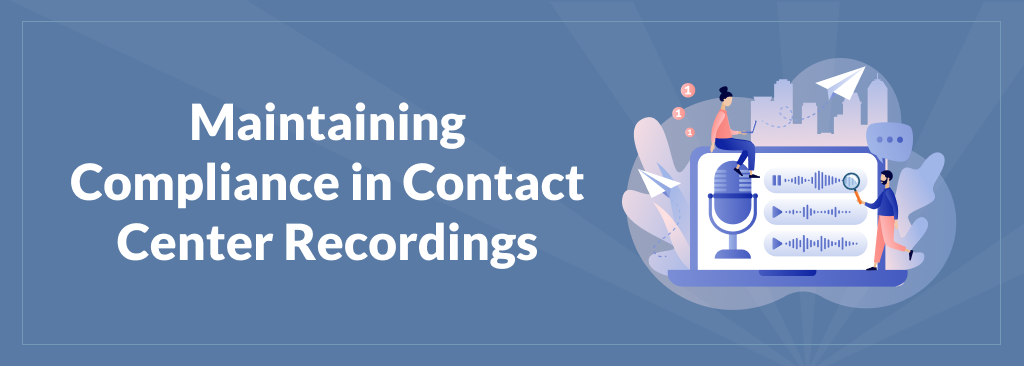Maintaining Compliance in Contact Center Recordings: Strategies for Secure Data Handling
Call recording is important for contact centers for a multitide of reasons, including safeguarding against compliance risk, providing concrete training opportunities and gathering customer feedback for targeted quality assurance efforts.
However, there is a growing number of regulations surrounding data privacy and call recording compliance. Plus, to make things even more complicated, not only do these regulations vary on a state-by-state basis, they are also constantly evolving.
So how can you ensure you’re compliant with these regulations? Keep reading to gain a clear understanding of how you can maintain compliance when it comes to contact center recordings.
How to ensure secure data handling and compliance
The key to ensuring secure data handling and compliance is gaining a concrete understanding of the compliance regulations your contact center is subject to. Such regulations may include:
- General Data Protection Regulation (GDPR): This regulation applies to any contact center that processes the personal data of individuals in the European Union. It requires contact centers to obtain explicit consent, collect minimal personal data, store data securely and grant individuals rights over their own data.
- Payment Card Industry Data Security Standard (PCI DSS): Applying to any organization that handles credit card information, this set of rules requires businesses to protect cardholder data by maintaining a secure network, identifying and addressing security vulnerabilities and implementing strong access control measures.
- Telephone Consumer Protection Act (TCPA): Any organization that contacts American consumers must comply with the TCPA. Regulations within the TCPA outline rules for protecting consumers against unwanted phone calls, and when companies can or cannot contact consumers. Additional regulations also include requiring contact centers to obtain prior express written consent before contacting consumers, not contacting customers before 8 a.m. or after 9 p.m. and making it easy for consumers to opt-out of future communication.
Besides these generalized regulatory requirements, there are also rules that apply to specific industries. For example, contact centers in the healthcare industry are required to comply with the Health Insurance Portability and Accountability Act (HIPAA), which protects the privacy and security of sensitive health information by requiring agents to implement identity verification, ensure data security and obtain consent before sharing health information with others.
In addition, contact centers in the financial services industry must comply with the Financial Industry Regulatory Authority (FINRA), which protects consumers in the financial sector by requiring contact centers to maintain accurate and secure customer records.
For more information on the specific regulations your contact center is required to follow, check out this resource.
Best practices for maintaining compliance with call recordings
Besides keeping close tabs on the regulatory environment, there is a set of best practices that can help protect your contact center against compliance breaches and ensure you won’t be subjected to hefty fines for breaking compliance.
For instance, ensuring your agents are fully informed regarding the steps they must take to ensure your contact center runs compliantly, such as obtaining consent and handling data securely, is key. Utilizing the call recordings you collect is a great tool for providing concrete training examples.
Furthermore, implementing the appropriate software features, such as a PCI payment system, and having a team dedicated to data security can help bolster your compliance efforts.
Contact center solutions for maintaining compliance with call recordings
TCN’s contact center software platform caters to everything you need to stay compliant with all regulatory requirements in any situation. Not only are these solutions optimized for secure data handling and agent training, but they also take the complicated out of compliance.
Maintaining compliance with call recordings is possible with solutions like:
- Call Recording Storage: Ensure compliance and enhance training with TCN’s Call Recording Storage, which stores all of your recordings in one location, allows you to easily find specific calls and scales with you as your business grows.
- List Management Services (LMS): Automate the preparation and scheduling of your data lists to reduce errors. Plus, boost compliance by effortlessly keeping current on consumer consent.
- Natural Language Compliance (NLC): Make compliance a breeze with this user-friendly tool. Get help with building and managing your compliance rules and minimize risk by automating compliance and ensuring your contact center is always audit-ready.
- Reassigned Number Database: Keep your contact center’s consent lists up to date and compliant by securely identifying disconnected cell phone and toll-free numbers.
- Phone Number Registration: Protect your business from being improperly classified as fraud or scam by registering your phone number and certifying your organization as a trusted caller.
Implementing strategies for maintaining compliance and handling data securely
Maintaining compliance with contact center recordings can be confusing, but it doesn’t have to be. TCN has an entire suite of resources to help you avoid painful TCPA penalties and stay in the loop with all of the regulatory changes, whether you’re concerned about the TCPA, Regulation F or anything in between.
Check out TCN’s compliance center for more information.
